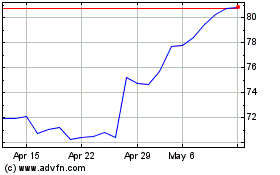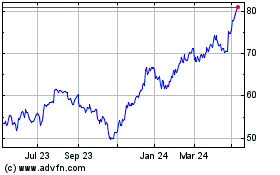By Vipal Monga and Nina Trentmann
French construction-materials company Cie. de Saint-Gobain SA,
is finding it harder to take its money out of China.
The conglomerate--like all multinationals operating there--faces
new delays in recent weeks as Chinese regulators impose tougher
restrictions on the movement of capital out of the country to slow
the yuan's decline.
"The process of authorization is going to become longer now,"
said Javier Gimeno, who heads Saint-Gobain's China operations. "The
procedures will be controlled more strictly."
Nearly 7% of Saint-Gobain's world-wide group sales come from
Asia and Oceania, a large part of that from China. The new rules
are adding confusion and anxiety to a process that had been getting
much easier over the past year, he said. The shift could cause some
multinationals to rethink future investments in a country where
once-sure payoffs are suddenly facing an uncertain return, analysts
say.
As of late November, firms that want to exchange yuan into
dollars in China now need approval for any transaction greater than
$5 million. They also face tighter limits on amounts they can
transfer in and out of bank accounts in China to affiliates in
other countries, in a practice known as "cross-border
sweeping."
"We hear a lot questions from corporates about whether they will
be able to repatriate their money in the future," said Alexander
Tietze, managing director at Acon Actienbank AG, a German bank that
advises companies on Chinese investments. He expects foreign
investments in China to slow, and cautioned that foreign takeovers
or plans for new joint ventures could fail because of the
controls.
With the Chinese economy struggling, multinationals have fewer
opportunities to reinvest there, which makes it more difficult for
them to do much with money trapped in China.
"A majority of clients are currently consolidating and
restructuring their China business," said Bernd-Uwe Stucken, a
lawyer with Pinsent Masons LLP in Shanghai. Some clients are
closing down their business, with new investments being the
exception to the rule, Mr. Stucken said.
Adding to the confusion: it is unclear where the limits are,
because regulators haven't published official rule changes, but
instead have given only informal guidance to banks, according to
Daniel Blumen, partner at Treasury Alliance Group, a consulting
firm.
Calls to the People's Bank of China weren't returned.
One official at a large multinational said that companies can
now only sweep amounts out of the country equal to 30% of their
Chinese assets. That is down from 100% under previous guidance, but
those figures couldn't be independently confirmed.
One banker at a large European bank said transfers that once
took between one to three days can now take more than a week to
complete.
The European Chamber of Commerce in China, which represents more
than 1,600 European companies, is aware of several cases in which
payments by multinational firms are stuck in China awaiting new
approvals, said Joerg Wuttke, president of the chamber. The new
regulatory scrutiny is disruptive to company operations, and
"exacerbates uncertainties regarding the predictability of China's
investment environment," he said.
China's State Administration of Foreign Exchange, known as SAFE,
and the People's Bank of China, are reacting to worrisome
indicators for investment in the economy. In 2015, foreign firms
and individuals poured roughly $250 billion into China, according
to the World Bank. While that is almost double the amount in 2009,
the recent trends have been negative. Last year marked a
second-consecutive foreign-investment decline, and a 14% drop from
2013.
Meanwhile, the yuan has been weakening, and many multinationals
have decided they would rather convert their funds to dollars and
transfer them out in anticipation of further weakening, said Ker
Gibbs, chairman of the American Chamber of Commerce in
Shanghai.
China's currency is down roughly 7% so far this year and the
capital flight has diminished the country's stockpile of foreign
currency to $3.05 trillion at the end of November, from $3.23
trillion in January, according to the People's Bank of China.
The new measures affect small and medium-size firms more
severely, as they usually operate with limited amounts of cash.
Nevertheless, the new regulation is also hurting bigger firms, said
Mikko Huotari, head of the China foreign relations research program
at Mercator Institute for China Studies, a German think-tank.
The recent clampdown has whipsawed corporate expectations, said
Caroline Owen, founder of RMB Global Advisors, a firm that advises
companies on using the yuan.
"China said it is making all these changes to open up the
border, but the message companies are now getting is that it's
conditional," she said "When things get tough, China will just roll
things back."
Write to Vipal Monga at vipal.monga@wsj.com and Nina Trentmann
at Nina.Trentmann@wsj.com
(END) Dow Jones Newswires
December 19, 2016 10:43 ET (15:43 GMT)
Copyright (c) 2016 Dow Jones & Company, Inc.
Cie de SaintGobain (EU:SGO)
Historical Stock Chart
From Jun 2024 to Jul 2024

Cie de SaintGobain (EU:SGO)
Historical Stock Chart
From Jul 2023 to Jul 2024
